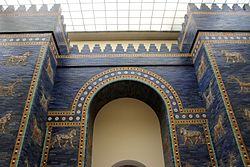
Back الانتداب البريطاني على العراق Arabic Mandatu británicu de Mesopotamia AST بیرلشیک عراق شاهلیغی AZB Каралеўства Ірак (мандат Вялікабрытаніі) Byelorussian ব্রিটিশ কর্তৃত্বের অধীনে ইরাক Bengali/Bangla Britansko mandatno područje u Mezopotamiji BS Mandat britànic de Mesopotàmia Catalan عێراقی زۆرەملێ CKB Irácké království pod britskou správou Czech Mandatområdet i Mesopotamien Danish
This article needs additional citations for verification. (January 2013) |
Kingdom of Iraq under British administration الانتداب البريطاني على العراق (Arabic) | |||||||||||||||
|---|---|---|---|---|---|---|---|---|---|---|---|---|---|---|---|
| 1921–1932 | |||||||||||||||
| Anthem: (1924–1932) السلام الملكي As-Salam al-Malaki "The Royal Salute" | |||||||||||||||
 | |||||||||||||||
| Status | League of Nations mandate | ||||||||||||||
| Capital and largest city | Baghdad | ||||||||||||||
| Common languages | Arabic · Kurdish Neo-Aramaic | ||||||||||||||
| Religion | Islam · Christianity Judaism · Yazidism Mandaeism | ||||||||||||||
| Demonym(s) | Iraqi | ||||||||||||||
| High Commissioner | |||||||||||||||
• 1921–1923 | Percy Cox | ||||||||||||||
• 1923–1929 | Henry Dobbs | ||||||||||||||
• 1929–1932 | Francis Humphrys | ||||||||||||||
| King | |||||||||||||||
• 1921–1932 | Faisal I | ||||||||||||||
| Prime Minister | |||||||||||||||
• 1920–1922 (first) | Abd Al-Rahman Al-Gillani | ||||||||||||||
• 1930–1932 (last) | Nuri al-Said | ||||||||||||||
| Legislature | Parliament | ||||||||||||||
• Upper Chamber | Senate | ||||||||||||||
• Lower Chamber | Chamber of Deputies | ||||||||||||||
| Historical era | Interwar period | ||||||||||||||
| 25 April 1920 | |||||||||||||||
| 23 August 1921 | |||||||||||||||
• Coronation of Faisal I | 23 August 1921 | ||||||||||||||
| 24 July 1923 | |||||||||||||||
| 5 June 1926 | |||||||||||||||
| 30 June 1930 | |||||||||||||||
• Independence | 3 October 1932 | ||||||||||||||
| Currency | Indian rupee | ||||||||||||||
| |||||||||||||||
| Today part of | Iraq Saudi Arabia | ||||||||||||||
| History of Iraq |
|---|
 |
|
|
The Kingdom of Iraq under British Administration, or Mandatory Iraq (Arabic: الانتداب البريطاني على العراق, romanized: al-Intidāb al-Brīṭānī ʿalā l-ʿIrāq), was created in 1921, following the 1920 Iraqi Revolution against the proposed British Mandate of Mesopotamia, and enacted via the 1922 Anglo-Iraqi Treaty and a 1924 undertaking by the United Kingdom to the League of Nations to fulfil the role as Mandatory Power.[1][2]
Faisal ibn Husayn, who had been proclaimed King of Syria by a Syrian National Congress in Damascus in March 1920, was ejected by the French in July of the same year. Faisal was then granted by the British the territory of Iraq, to rule it as a kingdom, with the British Royal Air Force (RAF) retaining certain military control, but de facto, the territory remained under British administration until 1932.[3]
The civil government of postwar Iraq was headed originally by the High Commissioner, Sir Percy Cox, and his deputy, Colonel Arnold Wilson. British reprisals after the capture and killing of a British officer in Najaf failed to restore order. The British occupiers faced the growing strength of the nationalists, who continued to resist against the British authority. British administration had yet to be established in Iraqi Kurdistan.
- ^ Wright, Quincy. “The Government of Iraq.” The American Political Science Review, vol. 20, no. 4, 1926, pp. 743–769. JSTOR, www.jstor.org/stable/1945423. Accessed 21 Jan. 2020
- ^ See original documents here
- ^ Ethnicity, State Formation, and Conscription in Postcolonial Iraq: The Case of the Yazidi Kurds of Jabal Sinjar. JSTOR [1]

